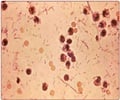Diagnosis of Dengue and Dengue Hemorrhagic Fever
Confirmed diagnosis of dengue infection requires lab tests:
1. Platelet count: Any fever not settling down after three or four days should invite further tests like a blood count, a routine urine and chest x-ray.
In countries like India one should also keep in mind malaria and do test to rule out the infection. Dengue fever is usually charcterised by lowering of platelets in the blood. It is due to the lack of platelets that the person is more prone to bleeding episodes. The platelets plug the bleeding points and their lack can lead to bleeding. Thrombocytopenia or platelets less than 100 000 cells per mm3maybe seen in dengue. The platelet count may need to be repeated everyday if they show a lowering trend. If these keep going down it is best to hospitalise the patient for further treatment. In severe cases platelet transfusion maybe required.
2. Hematocrit Test: Hemorrhagic dengue fever leads to leakage from blood vessels and this can lead to increased vascular permeability. This is manifested by one or more of the following - Increase by more than 20% in average hematocrit for age and sex.
3. Detecting specific antibodies: Serologic diagnosis requires collection of serum within 6 days after onset of symptoms. The serum is tested for detecting specific anti-dengue antibodies by Enzyme-linked Immunosorbent assay (ELISA). Increase of a fourfold concentration of IgG or IgM antibody titers to one or more of the dengue virus antigens in serum sample is diagnostic of dengue fever.
4. Isolation of the virus: Isolation of virus requires collection of serum sample from patients within 5 days after appearance of symptoms. To do the isolation of virus a 'Polymerase Chain Reaction (PCR)' is done. This detects the viral genomic sequence from Serum samples.
















